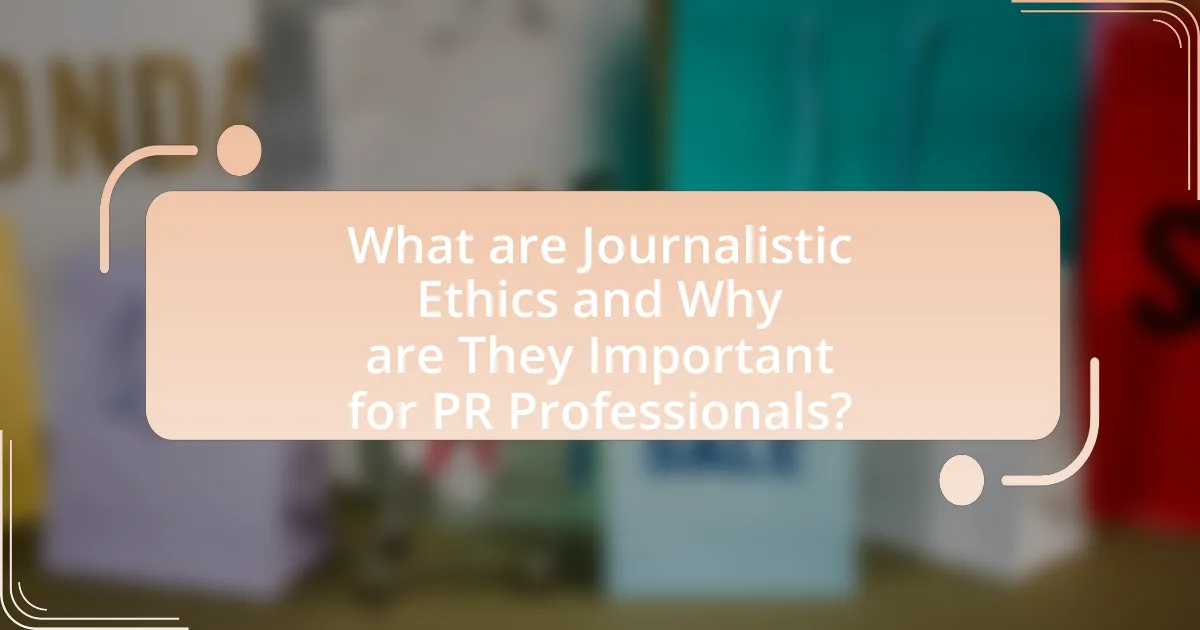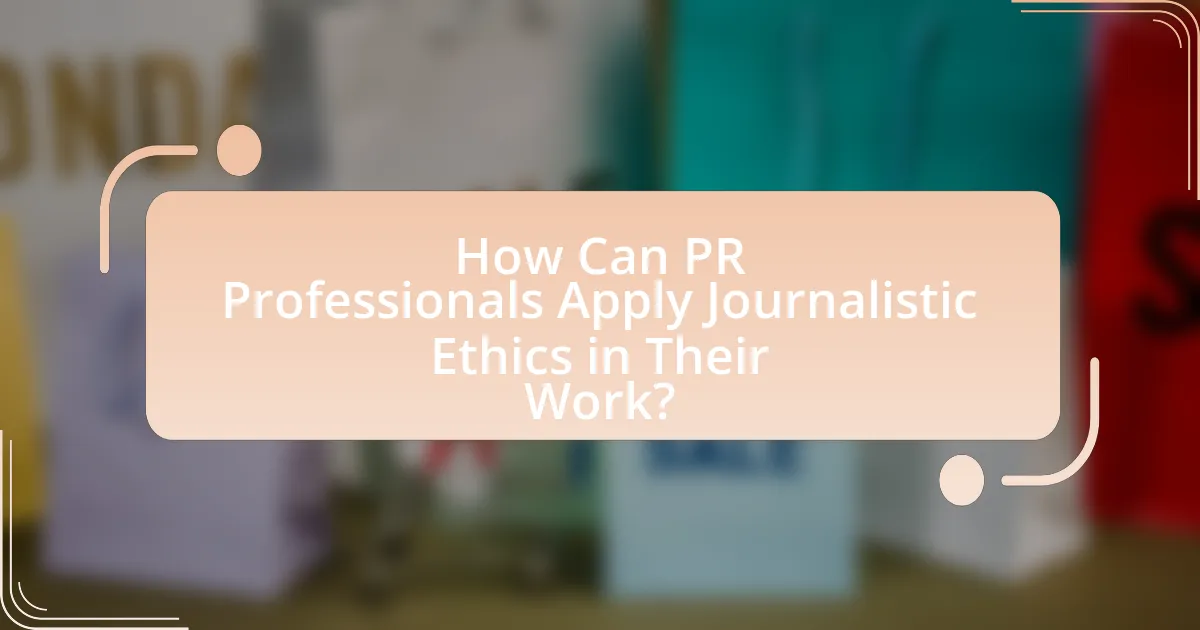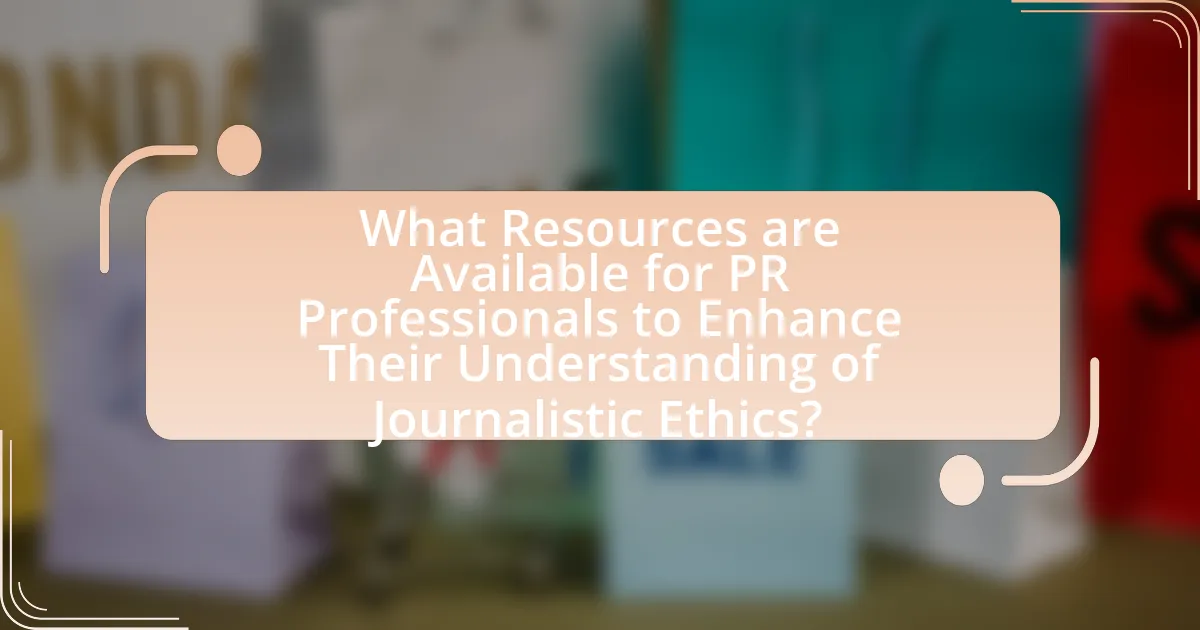The article focuses on the significance of journalistic ethics for public relations (PR) professionals, emphasizing principles such as accuracy, fairness, transparency, and accountability. It outlines how adherence to these ethical standards enhances credibility and fosters trust between organizations and the public. The article also discusses the consequences of ignoring journalistic ethics, including reputational damage and legal repercussions, while providing practical tips for PR professionals to navigate ethical dilemmas effectively. Additionally, it highlights resources and organizations that offer training and guidance on ethical practices in public relations.

What are Journalistic Ethics and Why are They Important for PR Professionals?
Journalistic ethics are the principles and standards that guide journalists in their reporting, ensuring accuracy, fairness, and integrity. These ethics are crucial for PR professionals because they help maintain credibility and foster trust between organizations and the public. Adhering to journalistic ethics allows PR professionals to effectively communicate their messages while respecting the media’s role in providing unbiased information. For instance, the Society of Professional Journalists outlines key ethical principles such as seeking truth, minimizing harm, and acting independently, which are essential for PR professionals to understand in order to build productive relationships with journalists and the audience.
How do Journalistic Ethics Influence Public Relations Practices?
Journalistic ethics significantly influence public relations practices by establishing standards for transparency, accuracy, and accountability. Public relations professionals must adhere to these ethical guidelines to maintain credibility with both the media and the public. For instance, the Society of Professional Journalists emphasizes the importance of truth and accuracy, which PR practitioners must reflect in their communications to foster trust. Additionally, ethical considerations such as avoiding conflicts of interest and ensuring fair representation guide PR strategies, ensuring that information disseminated to the public is not only persuasive but also responsible and truthful. This alignment with journalistic ethics ultimately enhances the effectiveness of public relations efforts by promoting integrity and fostering positive relationships with stakeholders.
What are the key principles of journalistic ethics that PR professionals should understand?
The key principles of journalistic ethics that PR professionals should understand include accuracy, fairness, transparency, and accountability. Accuracy requires that information presented is truthful and verified, which is essential for maintaining credibility. Fairness involves presenting all sides of a story without bias, ensuring that diverse perspectives are represented. Transparency mandates that journalists disclose their sources and any potential conflicts of interest, fostering trust with the audience. Accountability means that journalists must take responsibility for their work and correct any errors promptly. These principles are foundational in journalism and are critical for PR professionals to effectively communicate and collaborate with media outlets.
How can understanding these principles improve PR strategies?
Understanding journalistic ethics can significantly enhance PR strategies by fostering trust and credibility with the media and the public. When PR professionals grasp these principles, they can craft messages that align with ethical standards, ensuring transparency and honesty in communications. For instance, adhering to the principle of accuracy helps prevent misinformation, which can damage reputations and relationships. Research indicates that organizations perceived as ethical are more likely to gain positive media coverage and public support, as seen in studies by the Public Relations Society of America, which highlight the correlation between ethical practices and stakeholder trust. Thus, a solid understanding of journalistic ethics directly contributes to more effective and respected PR strategies.
What are the Consequences of Ignoring Journalistic Ethics in PR?
Ignoring journalistic ethics in public relations can lead to significant reputational damage and loss of credibility. When PR professionals disregard ethical standards, they risk disseminating misinformation, which can result in public distrust and backlash against both the organization and the media outlets involved. For instance, a study by the Pew Research Center found that 63% of Americans believe that news organizations often report news that is inaccurate, which can be exacerbated by unethical PR practices. Additionally, failure to adhere to ethical guidelines can lead to legal repercussions, as misleading information may violate advertising standards or consumer protection laws. Ultimately, the consequences of ignoring journalistic ethics can severely undermine the effectiveness of PR strategies and harm stakeholder relationships.
What are the potential risks for PR professionals who disregard ethical standards?
PR professionals who disregard ethical standards face significant risks, including damage to their reputation, loss of client trust, and potential legal repercussions. When ethical guidelines are ignored, it can lead to misinformation being disseminated, which undermines the credibility of both the professional and their organization. According to a 2021 survey by the Public Relations Society of America, 78% of respondents indicated that ethical lapses could result in long-term harm to a PR professional’s career. Furthermore, unethical practices can lead to regulatory scrutiny and lawsuits, as seen in cases where companies faced penalties for misleading advertising or false claims. These consequences highlight the critical importance of adhering to ethical standards in public relations.
How can unethical practices damage the reputation of both journalists and PR firms?
Unethical practices can severely damage the reputation of both journalists and PR firms by undermining public trust and credibility. When journalists engage in unethical behavior, such as fabricating stories or misrepresenting facts, they compromise their integrity, leading audiences to question the reliability of their reporting. Similarly, PR firms that employ deceptive tactics, like spreading misinformation or manipulating public perception, risk being viewed as untrustworthy. According to a 2021 survey by the Pew Research Center, 63% of Americans believe that journalists often report news that is inaccurate, highlighting the detrimental impact of unethical practices on the media’s reputation. This erosion of trust can result in long-term consequences, including loss of audience, diminished influence, and decreased effectiveness in communication efforts for both journalists and PR firms.

How Can PR Professionals Apply Journalistic Ethics in Their Work?
PR professionals can apply journalistic ethics in their work by prioritizing truthfulness, transparency, and accountability. By ensuring that all communications are accurate and not misleading, PR professionals uphold the ethical standards that journalists adhere to. For instance, they can fact-check information before dissemination and disclose any potential conflicts of interest, which aligns with the Society of Professional Journalists’ Code of Ethics that emphasizes the importance of honesty and integrity in reporting. This commitment to ethical practices not only enhances credibility but also fosters trust with the public and media, reinforcing the role of PR as a responsible communicator.
What are the best practices for integrating journalistic ethics into PR campaigns?
The best practices for integrating journalistic ethics into PR campaigns include transparency, accuracy, and accountability. PR professionals should ensure that all information disseminated is factual and verifiable, aligning with the journalistic principle of truthfulness. For instance, the Society of Professional Journalists emphasizes the importance of seeking truth and reporting it, which can guide PR strategies to prioritize credible sources and data. Additionally, maintaining transparency about sponsorships and potential conflicts of interest fosters trust, as highlighted by the Public Relations Society of America’s Code of Ethics. Lastly, establishing mechanisms for accountability, such as responding to public inquiries and correcting misinformation, reinforces ethical standards in PR practices.
How can transparency and honesty be maintained in PR communications?
Transparency and honesty in PR communications can be maintained by consistently providing accurate information and being open about the sources and motivations behind the messaging. PR professionals should prioritize fact-checking and ensure that all claims are substantiated with credible evidence, such as data from reputable studies or statistics from recognized organizations. For instance, a study by the Institute for Public Relations found that organizations that practice transparency are more likely to build trust with their audiences, leading to improved reputation and stakeholder engagement. By fostering a culture of openness and accountability, PR practitioners can effectively uphold ethical standards in their communications.
What role does fact-checking play in ethical PR practices?
Fact-checking is essential in ethical PR practices as it ensures the accuracy and credibility of information disseminated to the public. By verifying facts before publication, PR professionals uphold journalistic integrity and foster trust with their audience. According to a study by the American Press Institute, 62% of consumers are more likely to trust organizations that provide accurate information. This highlights the importance of fact-checking in maintaining a positive reputation and avoiding misinformation, which can lead to public backlash and damage to credibility.
How can PR professionals navigate ethical dilemmas in their work?
PR professionals can navigate ethical dilemmas by adhering to established ethical guidelines and frameworks, such as the PRSA Code of Ethics. This code emphasizes principles like honesty, transparency, and accountability, which guide professionals in making ethical decisions. For instance, when faced with a conflict of interest, PR professionals should disclose the situation to relevant stakeholders, ensuring that all parties are informed and can make educated decisions. Additionally, engaging in continuous education about ethical practices and participating in discussions with peers can enhance their ability to address complex ethical issues effectively.
What steps should be taken when faced with a conflict between PR goals and journalistic ethics?
When faced with a conflict between PR goals and journalistic ethics, PR professionals should prioritize transparency and honesty. This involves openly communicating the potential conflict to all stakeholders and assessing the implications of both the PR objectives and the ethical standards of journalism. PR professionals must evaluate the accuracy of the information being presented and ensure it aligns with ethical guidelines, such as truthfulness and fairness. Additionally, seeking guidance from ethical frameworks, such as the PRSA Code of Ethics, can provide clarity on how to navigate the situation. By adhering to these principles, PR professionals can maintain credibility and foster trust with both the media and the public.
How can PR professionals seek guidance on ethical issues?
PR professionals can seek guidance on ethical issues by consulting established ethical frameworks and guidelines provided by professional organizations such as the Public Relations Society of America (PRSA) and the International Association of Business Communicators (IABC). These organizations offer codes of ethics that outline best practices and standards for ethical conduct in public relations. Additionally, PR professionals can engage in continuous education through workshops, webinars, and courses focused on ethics in communication, which are often provided by these organizations. This approach ensures that PR practitioners stay informed about evolving ethical standards and can apply them effectively in their work.

What Resources are Available for PR Professionals to Enhance Their Understanding of Journalistic Ethics?
PR professionals can enhance their understanding of journalistic ethics through various resources, including industry guidelines, educational courses, and professional organizations. The Society of Professional Journalists (SPJ) provides a Code of Ethics that serves as a foundational document for ethical journalism practices. Additionally, the Public Relations Society of America (PRSA) offers resources and training on ethical standards in public relations. Online platforms like Coursera and edX feature courses on media ethics, which can further deepen understanding. Research studies, such as “The Ethics of Public Relations” by Patricia J. Parsons, published in the Journal of Mass Media Ethics, also provide valuable insights into the intersection of PR and journalism ethics.
What organizations provide training and resources on journalistic ethics?
Organizations that provide training and resources on journalistic ethics include the Society of Professional Journalists (SPJ), the Poynter Institute, and the American Press Institute (API). The SPJ offers a Code of Ethics and various training programs focused on ethical journalism practices. The Poynter Institute provides workshops and online courses that cover ethical decision-making in journalism. The API also offers resources and training aimed at improving journalistic standards and ethics. These organizations are recognized for their commitment to promoting ethical practices in journalism through education and resources.
How can PR professionals benefit from workshops and seminars on ethics?
PR professionals can benefit from workshops and seminars on ethics by enhancing their understanding of ethical standards and practices in communication. These educational events provide insights into the complexities of ethical dilemmas faced in public relations, equipping professionals with the tools to navigate challenges effectively. For instance, according to the Public Relations Society of America (PRSA), participation in ethics training can lead to improved decision-making and increased credibility among stakeholders. Additionally, workshops often include case studies that illustrate real-world applications of ethical principles, reinforcing the importance of integrity in PR practices.
What literature is recommended for a deeper understanding of journalistic ethics?
For a deeper understanding of journalistic ethics, “The Elements of Journalism” by Bill Kovach and Tom Rosenstiel is highly recommended. This book outlines the principles of journalism and emphasizes the ethical responsibilities of journalists. Additionally, “Ethics in Journalism” by David Ward provides a comprehensive overview of ethical dilemmas faced in the field. Both texts are widely recognized in academic and professional circles, making them essential resources for anyone looking to grasp the complexities of journalistic ethics.
What are the key takeaways for PR professionals regarding journalistic ethics?
PR professionals must prioritize transparency, accuracy, and accountability in their communications to align with journalistic ethics. Transparency involves disclosing conflicts of interest and providing clear sources for information, which fosters trust with journalists and the public. Accuracy is crucial; PR professionals should ensure that all information shared is fact-checked and reliable, as misinformation can damage reputations and relationships. Accountability means taking responsibility for the content shared and being open to corrections or clarifications when necessary. These principles are supported by the Society of Professional Journalists’ Code of Ethics, which emphasizes the importance of ethical standards in maintaining credibility and public trust in both journalism and public relations.
How can PR professionals ensure they uphold ethical standards in their daily work?
PR professionals can ensure they uphold ethical standards in their daily work by adhering to established codes of ethics, such as those from the Public Relations Society of America (PRSA). These codes emphasize honesty, transparency, and accountability, guiding professionals to communicate truthfully and avoid misleading information. For instance, the PRSA Code of Ethics states that members should “conduct themselves professionally, with truth, accuracy, fairness, and responsibility.” By regularly reviewing these ethical guidelines and participating in ongoing training, PR professionals can reinforce their commitment to ethical practices and stay informed about evolving standards in the industry.
What practical tips can help PR professionals navigate ethical challenges effectively?
PR professionals can navigate ethical challenges effectively by adhering to a clear code of ethics, maintaining transparency, and engaging in continuous education. A well-defined code of ethics, such as the one provided by the Public Relations Society of America (PRSA), offers guidelines that help professionals make informed decisions in complex situations. Transparency fosters trust and credibility, allowing PR professionals to communicate openly about their practices and intentions. Continuous education, including workshops and seminars on ethical standards, equips professionals with the latest knowledge and tools to address emerging ethical dilemmas. These practices are essential for upholding integrity and accountability in public relations.